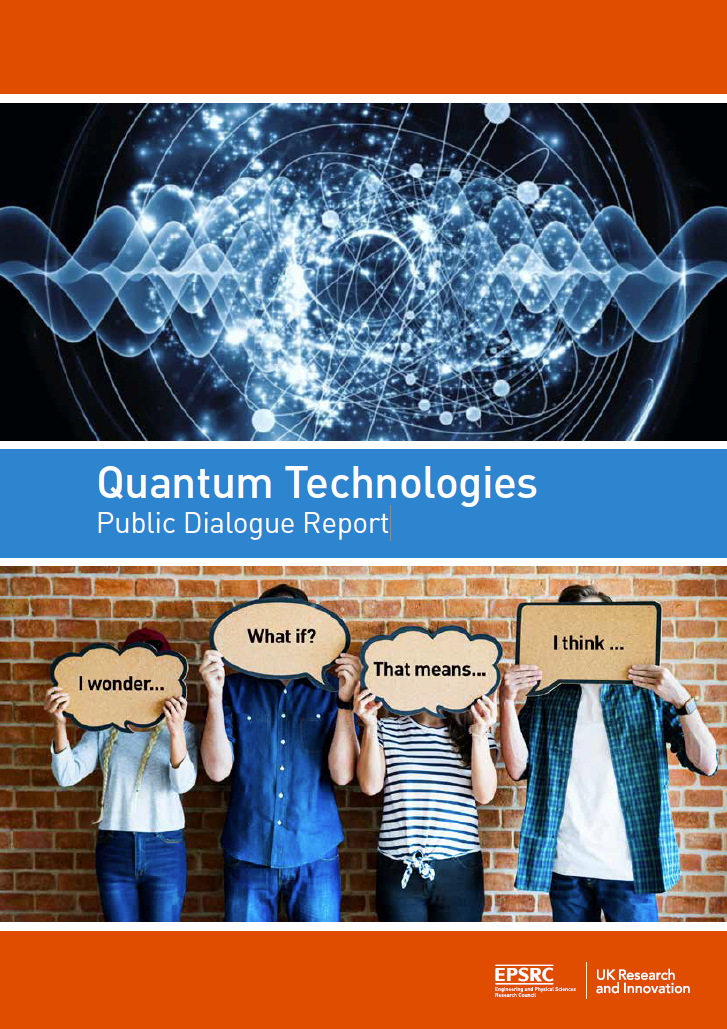Quantum Technologies Public Dialogue Report
The exercise was carried out in late 2017 by Kantar Media in order to better understand how the public views and feels about the Quantum Technologies (QTs) currently being developed by researchers and their potential applications. Evaluation of the public dialogue and the public dialogue process was carried out by 3KQ. The evaluation report will also be available from EPSRC in due course.
NQIT researchers were involved throughout the dialogue process - from attending an initial stakeholder workshop to acting as subject experts during the public dialogue workshops and organising an interactive activity for the dialogue participants. Professor Marina Jirotka, who heads our Responsible Research and Innovation (RRI) work, sat on the Oversight Board for this project.
The main aims of the public dialogue were:
- to explore public perceptions of Quantum Technologies, including exploring public aspirations, values, dilemmas, priorities and concerns
- to engage and inform the public about Quantum Technology and any devices which will emerge from the National Quantum Technology Programme and the wider Quantum Technology community
- to create a dialogue between experts, researchers and the public which will inform the Quantum Technology community
- to gather public experience and opinion from a broad range of the public with diverse backgrounds on a full range of Quantum Technology issues
- to seek public opinion on applications and uses of quantum devices and technology to identify new and interesting directions and purposes
- to use the results of the dialogue to inform research and innovation priorities in the next phase of the National Quantum Technology Programme
EPSRC’s Executive Chair, Professor Philip Nelson, said:
"EPSRC has a strong commitment to responsible research and innovation and we were conscious that Quantum Technologies are still quite new to the wider world. We therefore thought that it would be appropriate to gauge how people felt about the potential impacts of new systems, devices and products involving quantum principles. We are very grateful to all the participants both from the public and stakeholder groups as well as the academics who took the time to help explain their work and inform the process."
The dialogue was highly exploratory in nature - contributing the first substantive knowledge of public attitudes to Quantum Technologies and their applications. It took place in four UK cities (York, Oxford, Glasgow and Birmingham) in 2017 and gave some of the following key findings:
- There was wide familiarity with the word 'quantum' - however, beyond this there was low knowledge of what quantum was or about QTs. Participants generally held a limited set of surface-level associations, broadly relating to 'advanced technology' and science/physics. No one talked about quantum being 'spooky' or 'weird' - as some stakeholders had anticipated.
- Limited exposure to information about QTs had led to an initial feeling of neutrality towards them which meant that participants were yet to develop an emotional response to the topic. Significant minorities felt otherwise: participants with lower engagement with science tended to express some anxiety going into the start of the dialogue, and those more interested in science generally felt curious and excited.
- Greater exposure to information about QTs generally saw participants become more engaged and excited by the range of potential benefits associated with QTs - particularly once they understood how various QTs could impact upon and be relevant to their own lives. Whilst no participants became more negative about QTs, there was a small number of participants who felt disengaged from science and their level of interest remained unchanged.
- QTs were seen to have a wide range of benefits for individuals and society. The most engaging QTs were those which participants understood to have the greatest potential impact on individuals and society - in terms of saving or extending life (ie health technologies and humanitarian applications); finding cost-efficiencies in healthcare; and improving national and financial security.
